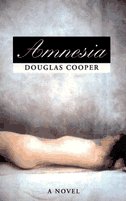 This book review was originally published in the Baltimore City Paper on February 23, 1994.
This book review was originally published in the Baltimore City Paper on February 23, 1994.
Canadian author Douglas Cooper’s debut novel, Amnesia, is a lot like an Escher painting. It twists your mind into strange positions, it dabbles in philosophically challenging angles and perceptions that could never exist in real life, and it ultimately leaves you more puzzled than satisfied.
The novel pretends at first to be a tale told by a stranger to a librarian who’s about to be married in a few hours. In true 19th century novel fashion, Izzy Darlow relates to the narrator the history of his steadily fragmenting family and his various methods of escape from it. Among the pursuits that give him solace are crime, religion, philosophy, and finally the love of a molestation victim named Katie, whose memories are constantly flushed as part of her therapy.
Cooper’s novel uses these events as a springboard for a discussion on the powers and dangers of memory, a dialogue that delves as deep as history itself. Does a higher meaning arise when one strings together the events of his or her life? And do people learn anything from the collected experiences and memories of themselves and others? The characters of the novel embody the various answers to these questions, from Izzy who stumbles from action to action without thought, to Katie who must constantly reinvent a universe that she doesn’t remember, to Professor Gold who claims that we have a spiritual existance that can only be accessed through memory.
At the novel’s beginning, Izzy tells the narrator that “something about this story makes it want to replicate, breed inwardly like cancer.” This holds true for Amnesia itself, which is composed largely of Izzy’s story; eventually the novel spirals in on itself like a dog chasing its own tail. When the dual narratives of Izzy Darlow and the frame narrator meet with a resounding crunch, Cooper cleverly breaks all the rules of storytelling in a maneuver that can’t be revealed without ruining the entire book.
There’s obviously a reason why Cooper is being compared with pseudo-postmodern authors like Italo Calvino and Milan Kundera. Amnesia is a play of symbols, an elaborate chess game that’s incomprehensible if you don’t know the rules. Actions don’t exist independently, they come with precedents and predictions, hints and shades of hints that reverberate throughout the novel’s structure. You can particularly see a resemblance in Cooper’s wrestling with the dark side of identity to novelist Paul Auster’s takes on the same subject in such modern masterpieces as The Locked Room and Leviathan.
Yet Cooper’s journeyman effort, while showing promise in the European white male school of literary self-analysis, is perhaps too convoluted for its own good. I found myself yearning for a more direct connection to Amnesia‘s characters and themes without having to struggle with abstruse concepts and technicalities.